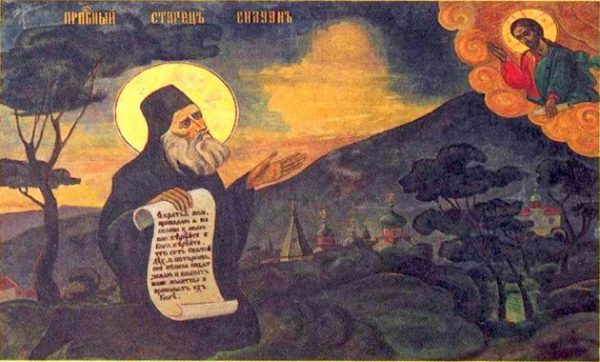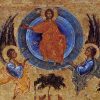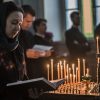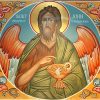Christ is the miracle that astounds us. He is the sign that God gave to all generations of all times. In His Person, every problem, every impasse, every tragedy received its solution. Being imitations of Christ and bearing Him in their heart, the saints are also the sign of God for their generation. They become tangible examples of the love of God in a world plunged into the darkness of ignorance and despondency.
Through their word and prayer, the saints give an answer to the questions of their contemporaries and a solution to their problems. It is rather God Himself that speaks through His closest friends, which are the saints, to every generation. And it is this word, coming either directly from God or from His saints, that will judge us on the last day.[1]
Elder Sophrony has been recently canonised officially and numbered together with the saints of the Church. For those who had the blessing to know him, but also for those who came into contact with his word of divine wisdom which he left us as a legacy, it is evident that he had divine wisdom.
His own elder, Saint Silouan, had already been canonised as ‘a prophetic and apostolic teacher of the Church’[2] thirty years earlier. For many, however, his spiritual stature is hidden behind the simplicity of his words. It was with this in mind that Saint Sophrony published the writings of Saint Silouan, accompanying them with his own introduction, explaining for the more refined intellectuals of his time the word of his Father in God which is holy and pure, but yet ‘incomprehensible precisely because of its simplicity’.[3]
The writings of Saint Silouan may be resembled to the Gospel according to Saint John, which is the poorest from the linguistic point of view, but contains perfection of meaning and revelation.
Externally, the life of Saint Silouan does not present any particular interest. He was an illiterate Russian peasant who lived in the Monastery of Saint Panteleimon on Mount Athos. Time does not allow us to go into more details concerning his monastic manner of life. There were, however, two milestone events that sealed his spiritual journey.
His biographer describes him as ‘a man of insatiable yearning for God’.[4] Indeed, his thirst for God consumed him even from before going to Mount Athos until the last day of his life. From the moment he came to the monastery, he lived with extreme spiritual tension. He was persistently striving to be exact in every aspect of monastic life, such as unceasing prayer, services, toilsome chores, vigils, fasting, brotherly love and of course, above all, obedience.
After six months, thinking that he had fulfilled all human righteousness, he became exhausted to the point of despair. He even accepted the thought that God does not hearken to his prayers, that He is inexorable.
Yet who is man, this fleeting creature, to address such a word to God? The mind of the young novice was blurred and his spirit was thrust into unbearable anguish and the darkness of hell. Nevertheless, he still went to church, where the brotherhood was gathered, and as he was venerating the icon of the Lord, he found the strength to call upon His Name: ‘Lord, Jesus Christ, have mercy upon me a sinner.’ Then he received the ineffable blessing of seeing the living Christ in the place of His icon.
At that moment, all his being was filled with divine grace and even his flesh longed to suffer for Christ’s sake. We know from the words of Saint Silouan that a great divine Light shone about him, that in the spirit he was transported to heaven, where he heard unspeakable words, that in that instant he received a new birth from on high.[5] Although he had heard since his childhood: ‘Glory be to the Father and the Son and to the Holy Spirit,’ it was at that moment that he became aware of the existence of the Holy Spirit. His heart was enlarged and Silouan, who lacked worldly education and had probably never seen a geographical map of the earth, began to intercede for the salvation of the whole world and desire for every human being the same good portion of grace that he was vouchsafed to receive.
For a certain while after the vision, his life was a Paschal feast. Yet his nature was not yet conformed to the grace he had been given and soon he began a long and relentless war against thoughts, especially the thoughts of vainglory. Because of these thoughts, the demons sometimes appeared unto him in visible form, tormenting him. He fought for fifteen years with courage and patience. He would barely sleep, pray with great tension and fervour, and work tirelessly.
One night, as he was trying to make a prostration before Christ, a demon appeared in front of him ready to receive his worship for himself. Disheartened, the saint sat on his stool and with pain of heart asked the Lord to instruct him what to do in order to humble his spirit, so that the demons might no longer trouble him. Then he heard the voice of God answering in his heart: ‘Keep thy mind in hell and despair not.’
The Lord offered him hell, but the saint accepted the word with gratitude. He began to practise the injunction of the Lord and, as he himself gives witness, ‘His mind was cleansed and his soul found rest.’
As the words of Christ in the Gospel also reveal, perfect knowledge of God does not consist of intellectual fabrications, but of the vision of His Face in the Holy Spirit and in the resounding of His voice in the heart. In order to show the Jews that they did not truly know God, the Lord told them: ‘Ye have neither heard His voice (of the Father) at any time, nor seen His shape.’[6] God is known through personal communion with Him. As Saint Sophrony would say, knowledge of God and theology as a state of the spirit is ‘communion in being’.[7]
Many claim that they had a vision of Christ or of the Mother of God or of the angels. Yet in the Church, there are firm criteria that verify the authenticity of the vision. In the particular case of Saint Silouan’s vision of Christ, both its immediate effects and the rest of the life of the Saint bare witness to the genuineness of his experience.
Let us examine in brief some aspects that seal the truth of Saint Silouan’s vision and the perfection of this holy man.
a) Grace is imparted to the body too
First, the grace he received was not a figment of his imagination, it was very palpable. Just as he felt the flames of hell roaring around him during his ascetic struggle, afflicting his whole being, body, soul and spirit, he also felt grace permeate his being to the marrow of his bones. His heart was kindled with such love for the Saviour Jesus, that he longed to suffer martyrdom for His sake.
b) The word of the perfect
When a holy ascetic from Caucasus, Saint Stratonicos, visited Saint Silouan for spiritual benefit, the Staretz asked him the question: ‘How do the perfect speak?’ He gave himself the answer that, ‘The perfect never say anything of themselves. They only say what the Spirit inspires them to say.’[8]
In reality, through his answer, he revealed his own manner of speaking and writing. Although his word is simple and unassuming, it opens new horizons. It glows ‘as unto a light that shineth in a dark place.’[9] It gives the solution to burning matters and shows the ways of life.[10] It is the fruit of his prayer and hope ‘that even one soul may come to love the Lord, and be turned to Him by the fire of repentance’.[11]
c) Spiritual humility
When Saint Silouan beheld the meek, peaceful and loving gaze of Christ, he knew in his heart the ‘indescribable’ divine humility, to which he sang ever since a hymn in his writings and which he sought ‘like a precious, lustrous pearl’.[12] Like the rest of the holy Fathers, he distinguished two kinds of humility, ascetic humility and charismatic or spiritual humility.
Ascetic humility consists of man’s struggle to diminish himself before God and his brethren. The summit of this humility is to consider oneself worse than all.
However, this humility is not perfect, as it involves comparison with other fellow-men. True divine humility was manifested by Christ through His descent from heaven to the nethermost parts of the earth and is a gift of His grace. Christ-like humility is expressed through the paradoxical fact that the uncreated, infinite and eternal God emptied Himself and gave His life to deliver His creature from death.
In the moments when grace visits him, man becomes aware of the fearful divine Providence and Economy. He sees the history of the world as the continuous loving care of God, and then he is convinced to the core of his being that he is not only the worst of all men, but also unworthy of such a God as Christ is.
d) Universal repentance
This awareness of our utter unworthiness and uselessness before the Lord Jesus, mingled with gratitude for His love to the end and His inconceivable Passion, lead to repentance that knows no end upon earth.
Both the beginning and the end of the Gospel of Christ speak about repentance. Without repentance man cannot have access to God. In other words, repentance is like unto a bridge that unites the two shores of the bottomless abyss.
In his personal repentance, in his striving to reconcile himself to God, Saint Silouan attained to extreme states. During his vision of the Lord Jesus, the state of the Lord was imparted to him. He received His grace which enlarges the heart to embrace all things, heaven and earth, God and man.
Christ lifted the burden of the sin of the whole world, ‘being made a curse for us’.[13] All those who follow Him and receive His state, like Saint Silouan, take the blame and repent for the fall of all mankind. How can one acquire this universal consciousness?
When the light of grace shines in the heart, it reveals the darkness man bears within, but also his consubstantiality with the whole of mankind. The neighbour is no longer someone else, a stranger preying on our possessions; he becomes, as the saints give witness, our brother and our life, a member of the Body to which we also belong. Then the man of God begins to lament not only for his personal sins, but also for the cursed inheritance of the world’s apostasy from God, praying for universal salvation.
In his chapter on Adam’s Lament, Saint Silouan describes in essence his own repentance. His strong crying with big tears echoed in the desert of a world immersed in despondency and despair, deprived of the quickening and enlightening grace of God.
Adamic repentance is suitable for the man who was created in the image and likeness of Christ. When such repentance is offered to God, it attracts His blessing and spreads it all over the whole world.
e) The Great Science
The main afflictions that oppress our times are: the spirit of pride and self-love, the darkening of the mind, the general despondency and total spiritual paralysis, the numerous involuntary hardships and, finally, despair.
That which makes Saint Silouan a sign for our generation more than anything, is the word he received from Christ: ‘Keep thy mind in hell and despair not.’ This word summarises the whole tradition of the Church, but in this particular case, it is expressed in a concise and axiomatic way.
Through the word He addressed to His servant, God revealed to him the weapon wherewith the enemy is vanquished. He made known unto him the means for healing the wounded body of humanity.
Hell is part of the created world. It is a state, to which the Lord Himself descended in order to fill every inch of creation with His creative and saving energy. Even during His earthly life, each time He was glorified, we see the Lord turn His mind and the mind of His disciples to His shameful death.
If this is the way – first of descent and then of ascent – through which Christ reconciled man with God, it ensues that man must follow it too.
Indeed, for man to become the likeness of Christ, he must stretch himself both downwards and upwards: first downwards through humility and self-condemnation. Man humbles himself before God, lowering his mind and psychology to the limit, but he does not despair. He also stretches upwards, because he has thrown an anchor in Heaven and places all hope in the searchless mercy of God. Through self-condemnation his arrogance is crushed, his whole heart is crushed. However, as the Fathers give witness, there is nothing more brave than a crushed heart.
The enemy has the tendency to go upwards, aiming to bypass even God. When the worker of godliness condemns himself and goes downwards, the enemy is by nature unable to follow him. Thus man is no longer ‘captive by the enemy at his will’[14] and begins to taste the freedom ‘wherewith Christ hath made us free’.[15] The humility required by self-reproach attracts grace which heals infirmities and makes up for any lack.
God does not judge twice. When we condemn ourselves voluntarily as worthy of hell, the Lord delivers us from future judgment. Surely, Saint Silouan experienced this state in its charismatic form. At a more ordinary level, however, it is attainable, even necessary for every Christian, by accepting afflictions with patience and hope in the mercy of God, rendering glory to His Name and reproaching only ourselves.
For Saint Silouan, the word of the Lord, ‘keep thy mind in hell and despair not,’ became an ascetic method. It was for him the Great Science in which he delighted and which he indicated as the way that leads to the calm haven of dispassion, and finally to eternal life.
f) Personhood
The person is not a psychological individual, but a man made in the image of God who strives to attain to likeness to God. Each Hypostasis of the Holy Trinity is perfect God, bearing the fulness of divine Essence and of divine Energy. Likewise, man becomes a hypostasis when he embraces in his heart the whole human existence from the beginning to the end and brings it before God in his prayer of intercession.
At the moment of the blessed vision, the young novice stood before Christ face to Face. He beheld His peaceful gaze and thus tasted of eternity. The state of Christ was imparted to him, and the divine will, which is the salvation of all, became his own. ‘The Staretz began to understand the commandment, “Love thy neighbour as thyself” as something more than an ethical imperative. In the word “as” he saw an indication, not of a required degree of love but of an ontological community of being.[16]
g) Prayer for the world
After the vision, Saint Silouan began to intercede for the salvation of all in prayer to God face to Face. He now saw those around him with the eyes of God and not with the blind eyes of human logic. He had compassion on every creature and interceded for the salvation of the whole Adam. For him, love for neighbour was the criterion which verified the authenticity of love for God.
h) Love for enemies
In essence, the holy Staretz did not separate people into friends and enemies, but into those that know God and those that do not. Being aware that humanity forms one body, he could no longer reject any of the members of this body, nor cease to desire its salvation. He believed that, ‘Those who dislike and reject their fellow-man are impoverished in their being. They do not know the true God, Who is all-embracing love. They have not found the way to Him.’[17]
The commandment of love for enemies is the summit of the commandments, because it reflects God’s mode of existence. He offers His holy and endless life to His enemy, to sinful man. Undoubtedly, this commandment surpasses man’s strength; it is unattainable without the grace of the Holy Spirit. This is why for Saint Silouan, the existence of this love was a token of the presence of the Holy Spirit, on a both personal and ecclesiastical level.
His teaching thus contains the unerring and trustworthy criterion for the One True Church, which can only be the Church bearing in her bosom souls that are habitations of the Holy Spirit, bearers of ‘Christ-like love for our enemies and Christ-like humility’.[18]
Besides the effects that we have mentioned, the authenticity of the vision of Christ by Saint Silouan is demonstrated precisely by the simplicity of his writings. The wealth of life that God imparts to his elect cannot be described with the mind. It is not the fruit of human imagination and does not stir up imagination in any way.
The saints do not simply write poetry, but describe their living experience. Perfection lies in union with the Lord. It is this relationship that we strive to cultivate and render eternal even from this life. Such words, as this word of Saint Silouan, play the role of a guiding star in our struggle.

















